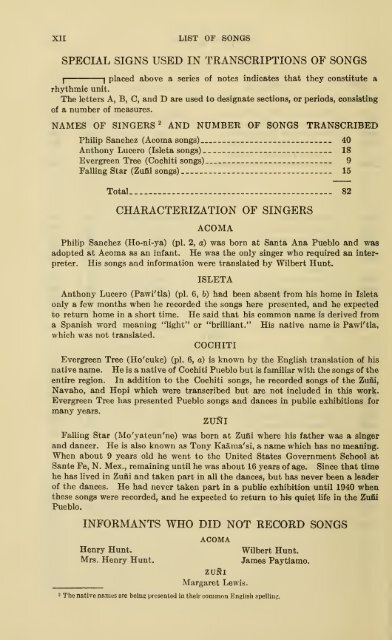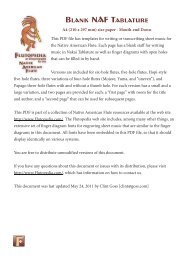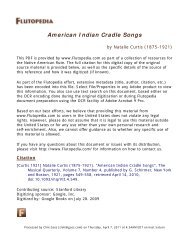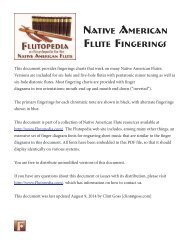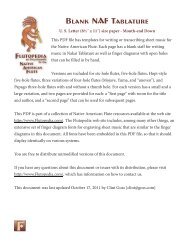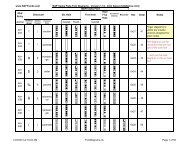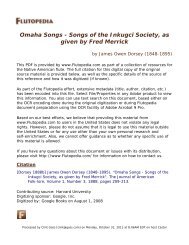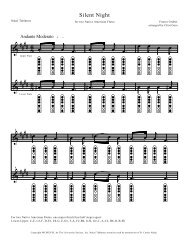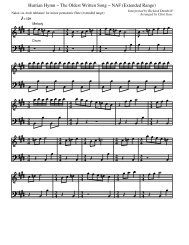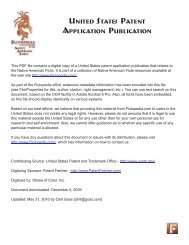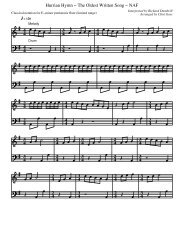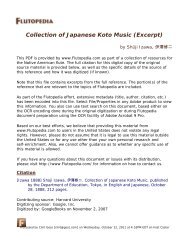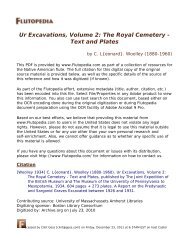Music of Acoma, Isleta, Cochiti, and Zuñi Pueblos - Flutopedia.com
Music of Acoma, Isleta, Cochiti, and Zuñi Pueblos - Flutopedia.com
Music of Acoma, Isleta, Cochiti, and Zuñi Pueblos - Flutopedia.com
Create successful ePaper yourself
Turn your PDF publications into a flip-book with our unique Google optimized e-Paper software.
XII LIST OF SONGS<br />
SPECIAL SIGNS USED IN TRANSCRIPTIONS OF SONGS<br />
I I<br />
placed above a series <strong>of</strong> notes indicates that they constitute a<br />
rhythmic unit.<br />
The letters A, B, C, <strong>and</strong> D are used to designate sections, or periods, consisting<br />
<strong>of</strong> a number <strong>of</strong> measures.<br />
NAMES OF SINGERS 2 AND NUMBER OF SONGS TRANSCRIBED<br />
Philip Sanchez (<strong>A<strong>com</strong>a</strong> songs) 40<br />
Anthony Lucero (<strong>Isleta</strong> songs) 18<br />
Evergreen Tree (<strong>Cochiti</strong> songs) 9<br />
Falling Star (Zufii songs) 15<br />
Total 82<br />
CHARACTERIZATION OF SINGERS<br />
ACOMA<br />
Philip Sanchez (Ho-ni-ya) (pi. 2, a) was born at Santa Ana Pueblo <strong>and</strong> was<br />
adopted at <strong>A<strong>com</strong>a</strong> as an infant. He was the only singer who required an interpreter.<br />
His songs <strong>and</strong> information were translated by Wilbert Hunt.<br />
ISLETA<br />
Anthony Lucero (Pawi'tla) (pi. 6, b) had been absent from his home in <strong>Isleta</strong><br />
only a few months when he recorded the songs here presented, <strong>and</strong> he expected<br />
to return home in a short time. He said that his <strong>com</strong>mon name is derived from<br />
a Spanish word meaning "light" or "brilliant." His native name is Pawi'tla,<br />
which was not translated.<br />
COCHITI<br />
Evergreen Tree (Ho'cuke) (pi. 6, a) is known by the English translation <strong>of</strong> his<br />
native name. He is a native <strong>of</strong> <strong>Cochiti</strong> Pueblo but is familiar with the songs <strong>of</strong> the<br />
entire region. In addition to the <strong>Cochiti</strong> songs, he recorded songs <strong>of</strong> the Zufii,<br />
Navaho, <strong>and</strong> Hopi which were transcribed but are not included in this work.<br />
Evergreen Tree has presented Pueblo songs <strong>and</strong> dances in public exhibitions for<br />
many years.<br />
ZUNI<br />
Falling Star (Mo'yatcun'ne) was born at Zufii where his father was a singer<br />
<strong>and</strong> dancer. He is also known as Tony Kaama'si, a name which has no meaning.<br />
When about 9 years old he went to the United States Government School at<br />
Sante Fe, N. Mex., remaining until he was about 16 years <strong>of</strong> age. Since that time<br />
he has lived in Zufii <strong>and</strong> taken part in all the dances, but has never been a leader<br />
<strong>of</strong> the dances. He had never taken part in a public exhibition until 1940 when<br />
these songs were recorded, <strong>and</strong> he expected to return to his quiet life in the Zufii<br />
Pueblo.<br />
s<br />
INFORMANTS WHO DID NOT RECORD SONGS<br />
Henry Hunt.<br />
Mrs. Henry Hunt.<br />
ACOMA<br />
Wilbert Hunt.<br />
James Paytiamo.<br />
ZUNI<br />
Margaret Lewis.<br />
The native names are being presented in theii' <strong>com</strong>mon English spelliuir.


